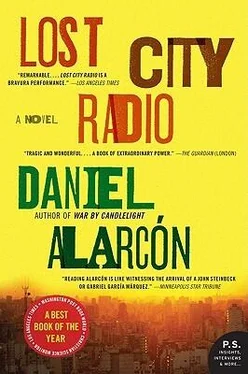“Norma,” he’d said, voice breaking. “Where is he?”
“Who?” she asked, because she always asked. It was her job. “Why don’t you tell us about him?”
On the other end, there was a long pause. Breathing.
“Sir? Who are we talking about?”
“Your husband,” said the old man, now weeping openly. “My son.”
Elmer cut to commercial immediately.
And it felt then the way it always had, the way it always would: like someone clutching her throat, trying and very nearly succeeding in squeezing the life from her. The worst of it passed in a matter of seconds, but the recovery took days, even weeks. Or a lifetime. During the long, uncomfortable break, Norma felt no one would look at her. Elmer came in with a cup of tea. “The wrong name, Norma. I’m sorry, but the wrong name and we’re dead. You and me both.” He said it without looking her in the eye.
She put on a record and let it play through. When she began again, there was a new caller, a new voice that made no mention of Norma’s loss, and the show resumed without incident.
Early morning now, ten years without war, and Norma has come to this place again. She is moving without thinking now. Give the boy a microphone. Give Manau a microphone. Headphones all around. There is the couch where Rey and I made love. Close eyes: remember. Not now. Breathe. There are lights blinking, a record playing, and Norma feels as if she is the conductor of an orchestra, that the city just waking or just drifting to sleep is hers to control. Cue music and let it play.
Breathe.
“Ladies and gentlemen,” she says when the song has finished. “Welcome to a special edition of Lost City Radio. My name is Norma.”
It has begun.
Rey described once the way the world melted in the heat of a psychoactive plant. Why was he so interested in these? The mystery, he said, lay in the discovery: whatever you hallucinated was something that had always been there, waiting to escape. The thrill, the surprise: what is it that you had buried from yourself? What emerged from the shadows, from the cobwebbed corners, from behind locked doors thrown suddenly, ludicrously, open? What did you find, Rey?
You.
Me?
You. Norma. You, in strange shapes and forms. As various animals, as air, as water. As light. As the dense and fertile earth. As a rhymed poem, as a song sung in a high-pitched voice. As a painting. You. As someone I don’t deserve.
When was this? Years ago. In the last year of the war. He nestled himself closer to her.
She has been talking now for a few minutes, and the realization scares her: the words are forming in her throat, not in her mind. The words are expelled and thrown into space before she has a moment to reflect on them. Rey. She’s said one of his names already, and so there’s no going back. Rey Rey Rey . There are no calls coming in. It is only her voice, roaming over the city. It might be, she thinks, despairing, that no one is listening. No one at all. Maybe this is the best way. The boy glances at her with tired eyes. “Who are you looking for?” Norma asks.
He shrugs, and she loves him. He looks nothing like Rey. “People from my village,” he says.
“Which is?”
“1797.”
“You have a list, don’t you?”
The boy nods. You can’t hear a nod on the radio. She asks him again, until he says yes, he does, and if he should read it.
Of course he must read it. Who else can get away with it? They won’t do anything to the boy. He is blameless. But she can’t bear it. Not yet. “In a moment,” she says.
But why wait? Isn’t this what she has always wanted? Isn’t this where her perfect show always ended?
“And you?” she says, turning to Manau. She has always loved shows with guests. There have been dozens of reunions in this room, nearly a hundred since the war ended — people have wept joyfully here, have embraced their loved ones, and have received the congratulatory calls of strangers. She has been witness to this, and perhaps if she hadn’t seen it, she wouldn’t believe it could happen. But now, it is as if she can feel the heat of those many reunions, this room suddenly peopled with ghosts.
“And you, Mr. Manau, who are you looking for?”
He seems surprised by the question. He shakes his head. His expression is glum. “No one,” he says.
“You came together. Tell us what that was like.”
The boy and his teacher look at each other, each hoping the other will talk. Finally, Manau coughs. “It’s a long way to come, Norma, for anybody. Especially for a boy of eleven, but even for me. We came on a truck and then on a boat and then on a bus that drove all night. Where else would we come? In this country, all roads lead to the city.”
“Let’s return to the list.”
“Of course.”
The boy says, “They’re the missing people from my village,” and before she can ask, he adds, “I didn’t know many of them. Only a few.”
“Do you want to talk about them?”
“Nico,” the boy says, “was my best friend. He left.”
“Everyone leaves,” offers Manau.
Norma smiles. “It’s true.”
“Aren’t you tired, Miss Norma?” the boy asks.
“Oh no,” Norma says. “Tired of what?”
“I don’t remember him, Miss Norma.”
“Nico?”
“Your husband,” Victor says. “My father.”
Norma blows the boy a kiss. “I know you don’t. No one expects you to.”
“I told my mother I did.”
“You’re a good boy.”
“I’m tired, Miss Norma, even if you aren’t.”
“Let’s read the list,” Manau says. “It’s why we’re here, isn’t it?”
“Sure,” Norma says with a nod. She’s been stalling, she can’t stand it any longer. “It’s why we’re here. Are you ready? Will you read for us, dear?”
Victor nods. You can’t hear a nod on the radio. It is just past three in the morning when he clears his throat and begins.
And now she can’t even hear the names. Norma has her eyes closed, and the war has been over for ten years. Let the boy read, let him, they won’t do anything to him. They’ll send me to prison, they’ll reopen the Moon for my benefit, and welcome me as they did my husband. I’m sorry, Elmer. Maybe they’ll pretend it never happened. It’s the middle of the night, and no one is listening anyway. It’s just us. He reads very well, and Manau should be proud of what he has taught the boy. The names mean nothing, not to Manau, not to Victor. One or another is familiar, a surname he has heard before, but most are empty. There is his father’s name, and he nearly skips over this one altogether. Norma sits upright at the sound, as if someone has touched her. “Pardon me?” she says. “Could you repeat that last one?”
Victor looks up from his list.
“What a nice name,” Norma says. It’s all she can do not to scream.
And in an instant, it has passed: here are the names written by the old man with the X-rays, and the ones added by the woman at the beach, and by the soldiers just now. Victor reads these as well, his voice not wavering but gaining strength. Thank God no one is listening. Thank God it’s only us in this sleeping city. Close your eyes and imagine we are alone. Nearly three dozen names; what good can come of this?
In two minutes, it is finished.
“The phone lines are open,” she manages, as if this were just another show. She looks hopefully at the switchboard, but there is nothing, not yet. There must be a record here somewhere: a song, any song to fill the empty space.
And now, it is time to wait.
IF REY had no answers about how the war began, it was very clear how it ended: almost ten years after it had started, in a truck, blindfolded, surrounded by soldiers smoking and laughing and poking him again and again with their rifles. He was taken along with two other men from the village, but the soldiers, for some reason, only seemed concerned with him. “Where you from, man?” one of them asked.
Читать дальше












